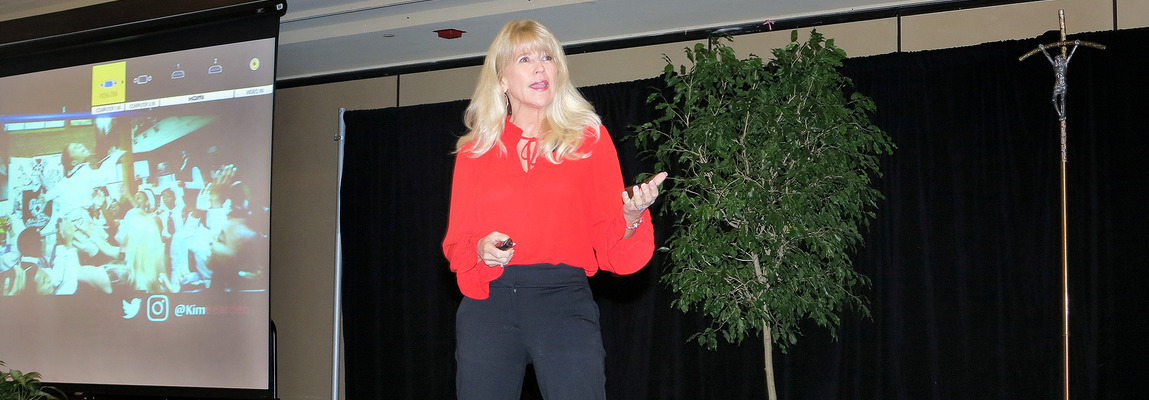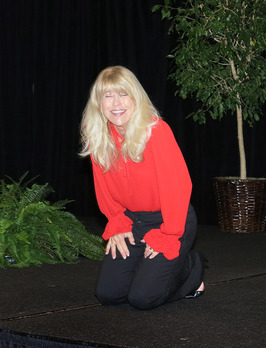Open communication creates happy school campuses
-
 By BETH DONZE
By BETH DONZE
Clarion Herald
At their 2022 back-to-school conference in Biloxi, elementary and high school administrators from the Archdiocese of New Orleans were reminded of some simple tools they could use to enhance communication with the three main groups with whom they interact: students, faculty/staff and parents.
“You (as an administrator) must exude what you hope to create,” said Kim Bearden, a 36-year teaching and administrative veteran from Georgia, delivering the conference’s Sept. 20 keynote. “So, if you want enthusiastic, joyful learners, then you’d better get enthusiastic and joyful! If you want a staff that is kind and supportive and lifts up others, you’ve got to be kind and supportive and lift up others!”
 Bearden, the co-founder of The Ron Clark Academy, a non-profit Atlanta middle school renowned for its loving and dynamic learning environment and record of academic excellence, advised the school presidents, principals and assistant principals to resist the tendency to overreact to every negative email that comes their way; to be sensitive to the known – and unknown – stresses a family might be undergoing; and to speak with adults personally or on the phone, rather than communicating with them exclusively by email or text.
Bearden, the co-founder of The Ron Clark Academy, a non-profit Atlanta middle school renowned for its loving and dynamic learning environment and record of academic excellence, advised the school presidents, principals and assistant principals to resist the tendency to overreact to every negative email that comes their way; to be sensitive to the known – and unknown – stresses a family might be undergoing; and to speak with adults personally or on the phone, rather than communicating with them exclusively by email or text.
“The words you say (to others) are never as important as the sincerity with which you say them,” she said.
Open-door policy
Bearden said she encourages her own parents and faculty to come to her directly when they have a concern, rather than to unproductively discuss the problem with others on or off campus.
“If you can project that you’re the kind of person who can take complaints, it goes so far. They just need to feel somebody is listening,” Bearden said, adding that she always thanks people for coming to her with any critiques or ideas they might have.
The author of three books inspired by her more than three decades of experiences as an educator, Bearden identified a host of “culture killers” in the lives of school administrators – for example, when they fail to speak to staff and smile; when they fail to communicate quickly and clearly after observing a problem; and when they fail to admit that they don’t know an answer.
Daily teacher appreciation
She said one of her “game-changing” practices is to “listen first” – a habit she cultivates daily on her campus by going into a random classroom to ask the teacher to “tell me something good” that is happening in class today.
Showing genuine interest in a teacher’s daily work and acknowledging his or her achievements is a win-win that fosters mutual respect between the administrator and the faculty member. Proud and self-confident teachers promote a school culture of positivity and learning rather than one mired in negativity, Bearden said.
“Intentionally surround yourself with people who feed your soul,” she urged the school leaders.
Finally, Bearden reminded the administrators that they will never know the full “ripple effect” their vocation will have on students long after they have graduated. Something as small as a hug or taking time to quietly listen to a student’s worries just might be remembered by the recipient for years to come.
“It’s not what happens to you that defines who you are; it’s what happens through you,” Bearden said. “It could be in the millions of lives that have been exponentially affected by yours!”
The annual conference is coordinated by the archdiocesan Department of Catholic Education and Faith Formation. Kim Bearden is the author of “Crash Course: The Lessons My Students Taught Me,” “Talk to Me: Find the Right Words to Inspire, Encourage and Get Things Done” and “Fight Song: Six Steps to Passion, Power, Peace and Purpose.”
[email protected]


